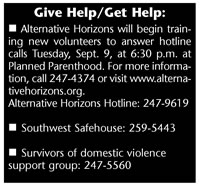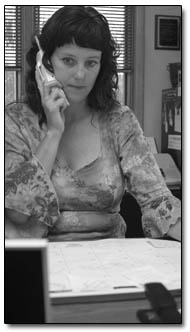An incident of domestic violence occurs every 15 seconds somewhere
in the United States, according to the FBI, and La Plata County
contributes to this problem.
“Basically, domestic violence happens on all socio-economic
levels – it happens to everybody,” said Roseann
Kutzleb, executive director of Alternative Horizons, a Durango-based
nonprofit that offers a 24-hour domestic abuse hotline. “It
isn’t just an ethnic or economic group...it’s not
just poor people,” Kutzleb said.
Among other services, Alternative Horizons, also offers legal
representation for divorce and child-custody cases and gives
free ongoing support and therapy. In 2002, Alernative Horizons
answered 1,755 calls and served 648 people with the help of
50 volunteers. Nevertheless, Kutzleb said the call-load is unpredictable,
ranging from a two-year high of 226 calls in June to virtually
no calls in recent months.
“We’ve been all over the board,” she said.
The hotline, which is staffed by volunteers, offers a list
of resources to callers, including the Southwest Safehouse,
she said.
“We’re in constant contact with the safehouse and
have been since 1985,” Kutzleb said.
 Run
by the Volunteers of America, the safehouse is a temporary shelter
for women and children who seek protection from violence at
home.
Run
by the Volunteers of America, the safehouse is a temporary shelter
for women and children who seek protection from violence at
home.
It opened its doors in 1985 after a report showed that Southwest
Colorado had some of the highest numbers of domestic violence
of any rural region in Colorado, according to John Gamble, director
of the safehouse. Gamble added that prior to the mid-1980s,
“beating your wife really didn’t have the status
of a crime.”
“It was a feminist movement,” he said. “It
was women starting to say, ‘We’re going to take
care of women.’”
The safehouse, with its secret location, offers women and children
in need of emergency shelter a safe place to stay as well as
access to resources like permanent housing, education and health
care.
Before the safehouse opened, Alternative Horizons offered emergency
shelter – sometimes in hotels or the homes of volunteers
– for one to three nights. Now, the average stay in the
safehouse is four weeks. In 2002, the safehouse housed more
than 700 people, 150 of them children. It can comfortably house
20 people a night, but no one is ever turned away.
“It may mean pulling out cots and hide-a-beds and housing
people in the living room, but we think that’s better
than saying, ‘Sorry Charlotte – there’s no
room at the inn,’” he said.
Despite the service it provides, the safehouse initially met
some resistance in the community, Gamble said.
“When I started, the litany was, ‘So what –
are you in the business of breaking up marriages?’”
Gamble said. “I’d answer, ‘No, we’re
not smart enough to tell another human being how to run their
life. Our business is how to get violence out of families.’”
These days, it’s another story. Gamble said the community
is supportive of the safehouse and the people it serves. For
example, the Humane Society houses pets
 |
Roseann Kutzleb, executive
director
of Alternative Horizons/Photo by Todd Newcomer |
while women stay at the safehouse, the VOA Thrift Store provides
clothing vouchers, a La Plata Electric Round Up grant recently
helped the safehouse buy school supplies for kids living there,
and 9-R teachers extend extra understanding to safehouse students
who may be “acting out” because of their recent
experience, Gamble said. Local dentists have even provided free
dental care for residents, one of the biggest needs of safehouse
visitors, at Gamble’s behest.
“I’m a dangerous man to know because I call people,”
Gamble said. “We do what we do, but we couldn’t
do it half as well without the whole town pitching in.”
Law enforcement also is helpful if a woman at the safehouse
breaks the one hard-and-fast rule: keeping the safehouse location
confidential. Although a woman who breaks confidentiality will
have to move out and never come back, some women do it anyway,
Gamble said.
“It’s called a red dot – it means you’re
never welcome,” Gamble said, explaining that revealing
the location to an abusive partner puts staff and residents
of the safehouse in danger.
But, he added, “If there’s a problem at the safehouse,
there’s help (from the police) fast.”
A listening ear
Cassandra Papp, a volunteer at Alternative Horizons, said she
has picked up several women and driven them to the safehouse
or to meet safehouse employees.
“It felt great to know that I was securing their physical
safety at the moment – it was gratifying for both of us,”
Papp said.
She said her best experience as a volunteer is meeting women
face to face, listening to what they have to say, and then leaving
after the women formed their own decision about what to do next.
 |
On an average night, 14 people stay at
the Volunteers of America Southwest
Safehouse and half of them are children./Photo courtesy
Southwest Safehouse |
“It’s really about listening skills and really
hearing what they’re saying,” Papp said. “The
anticipation of receiving a call was nerve wracking (when I
started), but once I heard the victim’s voice on the other
end, I knew it was worth it.”
Kutzleb said that friends and family of women or men who might
be in an abusive relationship also should practice their listening
skills.
“If you have a friend or family member in that situation,
don’t take it upon yourself to suggest they leave,”
Kutzleb said, adding that violence increases 75 percent when
the person does leave the relationship.
Kutzleb stressed that the hotline is completely confidential,
so no one should hesitate to call it – including men.
She said there are male advocates to assist men who have been
battered, though she said 90 to 95 percent of domestic violence
occurs against women.
“Making that first call is the hardest call to make,
but after you do, the doors that open are endless,” Kutzleb
said. “There’s a wealth of resources in this community...a
very caring community with a lot of different services to help.
If you want a kind, compassionate ear to talk to, call.”
And above all, the message to people who find themselves in
a violent relationship is: “You are too important and
valuable a human being to be subjected to violence,” Gamble
said.

